Indore has been recognized as the No.1 ranked city in Swachh Survekshan for last 3 years. The city authorities have imbibed a culture of excellence in every assignment they get. The same had reflected in responding to every framework and contest. The ClimateSmart Assessment Framework is very different from the previous surveys launched by the Government of India, and hence a specific strategy was developed for it. The Team of Indore Smart City Development Limited headed by its CEO, Ms Aditi Garg, IAS, had left no stone unturned to reflect a true picture of Indore in the assessment.
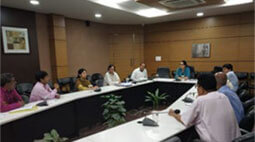
These committees were formed with the objective of communication to the Heads of various departments and seek support from them for this noble cause. Meetings at regular intervals were held to ensure coordination across the departments. For instance, the city-level stakeholder committee meeting was held fortnightly.
These workshops were organized to sensitize different departmental employees about the framework and resolving their queries and issues in the gathering of data. The main objectives of these workshops were:
For instance, in a meeting with the Forest department, the required data was not readily available; after the interaction, they started the process of making biodiversity registry and completed it until the time of submission.
Data champions were selected for each of the different indicators. The principal work of data champion was to follow up and contact departmental heads wherever they are facing difficulties in data extraction from different departments, and finally upload the data in climate change framework portal.
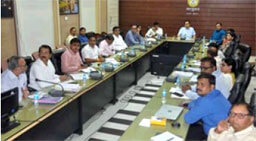
For instance, Ms Shraddha Tomar had been given the responsibility for waste management indicator since she had good exposure in the municipal solid waste category while Mr. Shyamal Agravat had been given the responsibility of rest of the sections, seeing his diverse experience and networking skills.
Data champions were selected for each of the different indicators. The principal work of data champion was to follow up and contact departmental heads wherever they are facing difficulties in data extraction from different departments, and finally upload the data in climate change framework portal.
Awareness of public, by sensitising them about the challenges related to climate change scenario and future outcomes of the same. Information of the public through newspapers and involving the public by registering their feedback from social media and Indore Smart City’s website. This helped Indore Smart City in gathering relevant data available in the public sphere.
For example - An environmental expert from the public had voluntarily offered his documentation for native tree species to help Indore Smart City Development Limited.
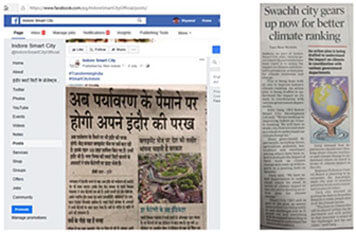
Indore Smart City had roped in various organisations at different levels. Various institutions like the College of Agriculture and Devi Ahilya University (DAVV) have subject experts of urban planning, environment, and forest who had come up with the historical data. Contributions were received from many departments such as:
Mapping of the questionnaire to different departments and extraction of the data was done, the deadlines were given to the different departments based on the difficulty in the gathering of the data. The initial response was motivating, and the team went on more specifically onto collecting the data.
The invitation to the workshop came as the opportunity to clear all the doubts and discuss the problem in a suitable forum with like-minded ones. The video-conferencing sessions with the Ministry had proved to be equally helpful to discuss problems. As per the CEO’s instructions, the team had tried to fill the whole questionnaire at least twice and came back with the difficulties before the workshop.
The workshop was held in New Delhi and the team had participated with enthusiasm and sought clarification of bottlenecks and difficulties. The same had been escalated and addressed in the workshop. Barring few concerns, the workshop had given good clarity on the future path. It was really helpful to interact with subject matter experts on the issues. It was of immense satisfaction to know team Indore was on the right path.
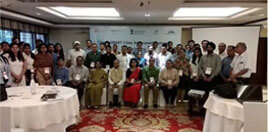
The crucial time to act had come which could become a decisive factor. The sections were identified which would fetch us most markings with the given time and prepared the best. Team Indore had started uploading all the available documents. The late evening discussions often took place where progress was reviewed and facilitation took place. With the CEO-madam being proactive, it was a routine scenario that a state-level or city-level department’s official got a call from the Indore Smart City office after office hours where they were asked/requested/followed up to share relevant details.
Visits to Indore Municipal Corporation offices and other offices like Pollution Control Board, MPPKVVCL (Electricity company), Forest department, Agriculture department and Agriculture college had been carried out, in order to make the official understand the need, and sensitising the department heads by giving them submission deadlines.
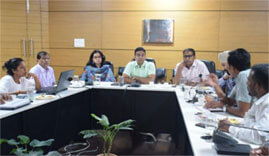
The team members updated the progress and challenges to the CEO directly on a daily basis. While on the leadership end, the CEO helped the team in every possible way, by being approachable and facilitate the proceedings - from using personal contacts in the administration to talking to the Heads of different organisations for providing the data.
The Executive Director of Indore Smart City, Mr. Asheesh Singh gave timely, specific, and outcome-based interventions in steering Indore Municipal Corporation’s departments and the city at large.
It had become a tough nut to crack as some of the entities like NRSC were not communicated about the requirement beforehand, and when it was sorted out, they were asking for user charges and the process was too slow. The team was not confident enough to get the base maps from them in time.
Team member consulted the experts and with the guidance given, they arranged the maps from the City Planning and Town and Country Planning Department.
City Heat Island Map: This data was not maintained but referring to archives of Indore Municipal Corporation. There was a document named climate resilience strategy where the heat island map was available.
This record was not maintained at all, as an alternate way it was decided to give the disaster data.
Some initial hiccups came in the form of unavailability of historical data, where the stakeholders were not aware of the long-term implications and in some of the offices the reason was improper handovers of data from their predecessors and no response from the follow up with other government departments. Having no single point of contact was also a challenge. The team had resolved it by contacting the erstwhile officers and higher authorities, and strongly followed up with them and got the data.
The Enablers of Indore’s Good Work